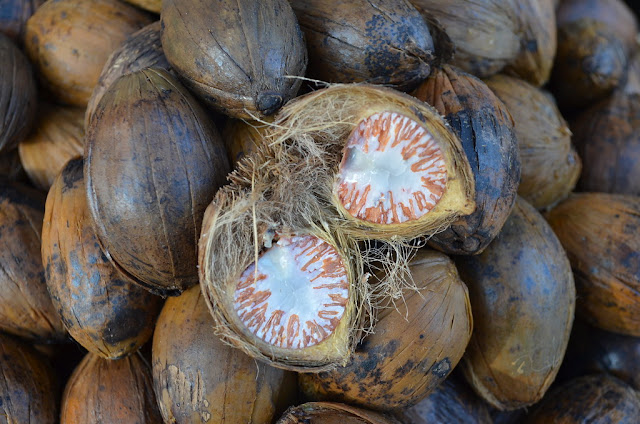Areca nut, often known as Areca seed, acts as the kernel of the Betel palm palm and holds an important role in the custom and economy of numerous countries across Asia. The seed is masticated for its stimulant impact, especially when paired with paan (a blend of betel vine and lime paste) or tobacco. This country, Indonesia, as it is one of the largest growers of Areca nuts, has become a major player in the universal distribution system for this good.
Within the Indonesian archipelago, masticating Areca seed, referred to locally as "sirih pinang," holds a deep-rooted custom. It frequently used in sacred practices, social functions, and health remedies. Throughout rural areas, particularly in Sumatra, the island of Kalimantan, and the island of Sulawesi, the habit of masticating Areca seed is still deeply rooted. The Areca bears social and cultural significance, typically acting as a representation of hospitality or featured in traditional ceremonies, like marriage ceremonies.
From an economic perspective, the farming of betel nuts supplies employment for a significant number of small-scale farmers, primarily in areas including Aceh, West Sumatra, and Sulawesi's northern provinces. For these populations, Areca palm seed acts as a significant commercial crop, boosting their incomes and holding a key part in the economy of the region.
Indonesia’s equatorial climate, nutrient-dense soil, and wide coastal regions offer the ideal environment for Areca catechu palms to grow abundantly. The growing procedure is simple and demands manual work, involving seeding palms, tending palm plantations, and collecting the betel nuts after about five years. When the nuts are collected, the betel seeds are either air-dried, parboiled, or preserved, based on the tradition of the region and the demand from the market.
The betel nut suppliers in Indonesia boasts a diverse production chain, including local farmers, domestic dealers, bulk sellers, and global shipment companies. Occasionally, betel seeds are marketed in their fresh state, but usually, they go through drying to ensure a longer shelf life and to fulfill the requirements of international buyers.
Global market demand for Areca nut, specifically in regions such as India, Pakistan, Taiwan, and other parts of Southeast Asia, has been rising in the past decade. Betel nut is highly sought after in these countries, where chewing it is still a cultural tradition, in spite of the heightened understanding of its health-related concerns. The Indian market is the largest importer of betel nuts from Indonesia. The Areca nuts are treated in several variations, like whole Areca nuts, split nuts, or as powder, in line with the demands of the local market. The practice of chewing betel nut in preparing traditional paan continues to be prevalent in the region of India, and Areca nut from Indonesia is generally liked for its superior quality and abundance.
Taiwan is another increasing market for Indonesian betel nuts, where the custom of betel seed chewing is common, especially among men in countryside. Taiwanese traders choose Indonesian betel nuts as a result of their competitive pricing compared to local Areca nut cultivation. Even with the profitable opportunities of the Areca nut industry, Indonesian suppliers struggle with several issues in broadening their customer base and enhancing their supply chains.
Over the past few years, healthcare studies have linked the consistent consumption of betel nuts with mouth cancers and various health issues, raising worries about its health implications. This has led to some regions enforcing tighter controls or in some cases forbiddances on the trade and ingestion of betel nut items. For instance, the island of Taiwan has established strategies to curb betel nut chewing due to growing occurrences of mouth cancers. Indonesian manufacturers, therefore, must deal with the obstacle of maneuvering through these guidelines while sustaining their global markets.
Even though the Indonesian betel nut industry is broad, it lacks uniform quality control measures and uniform processes. This might cause variability in product quality, which influences its global standing. Several producers have initiated integrating more rigorous classification, ranking, and packaging practices to secure reliability, but the overall sector still has room for improvement.
Similar to many crops, Areca nut farming elicits concerns about deforestation and ecological damage. In certain areas, Areca nut farms have expanded into formerly tree-rich areas, leading to a reduction in species diversity and interruption of habitats. Confronting these sustainability challenges is imperative for the enduring health of the industry.
The country of Indonesia is not the sole country manufacturing Areca palm seed. Other Southeast Asian states, such as Thailand, Burma, and Sri Lanka, in addition have prosperous Areca nut sectors. Indonesian suppliers must remain competitive by providing superior quality items, effective supply chains, and advantageous pricing to maintain their share of the global market.
In spite of the obstacles, the outlook remains encouraging for the betel nut sector in Indonesia. The world market for betel seed is foreseen to continue to thrive due to the deeply ingrained cultural habits of buyers in critical markets. As long as countries for instance the country of India and the island of Taiwan continue to want top-notch Areca seeds, Indonesian suppliers are well-positioned to address this need.
To secure ongoing development, suppliers of betel nuts in Indonesia are emphasizing modernizing their production methods, refining quality assurance, and investigating new markets. Some firms are allocating resources to technology and infrastructure to enhance their processes and boost effectiveness. Additionally, there is growing interest in natural and environmentally friendly products, which could present new opportunities for Indonesian suppliers prepared to implement eco-friendly practices.
The country of Indonesia's betel nut industry is a significant contributor to both the local and world economy. It provides livelihoods to numerous small-scale farmers and fulfills the requirements of overseas markets, particularly in the nation of India and the island of Taiwan. However, challenges such as health risks, government regulations, and competitive pressures must be confronted for the industry to flourish in the future. By concentrating on eco-friendliness, quality control, and creative solutions, producers of Areca nuts in Indonesia can persist to play a significant role in the international supply chain.
